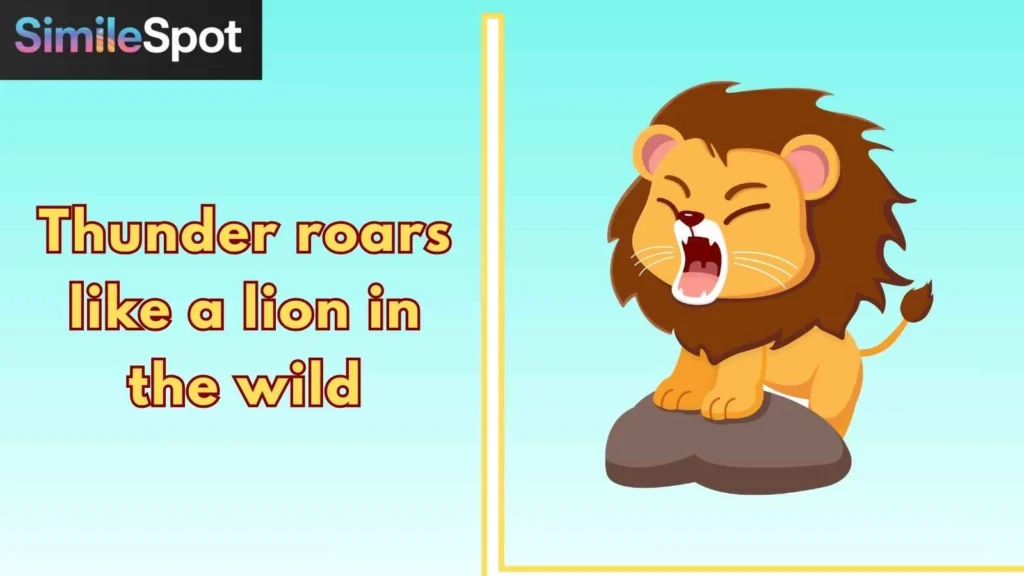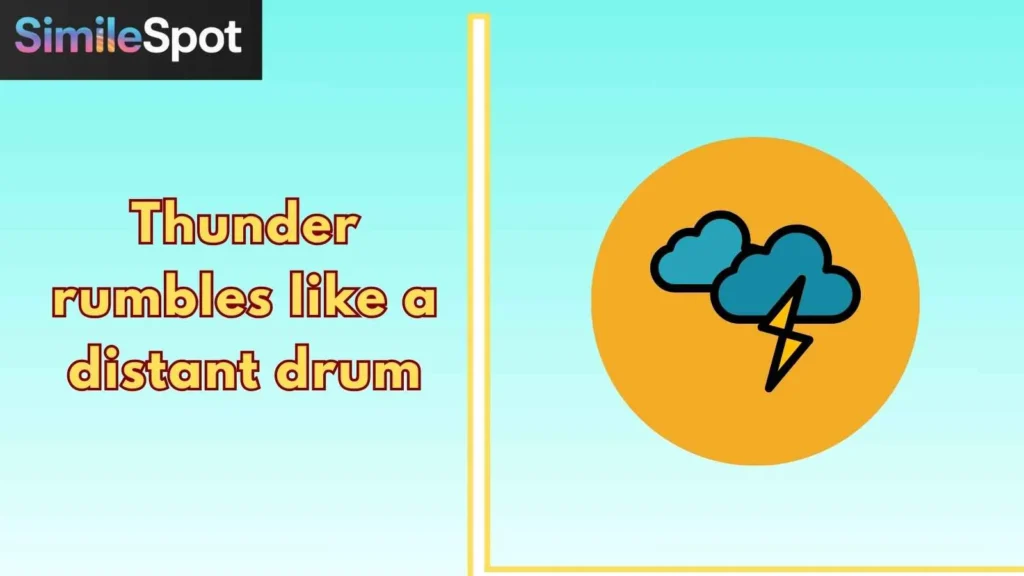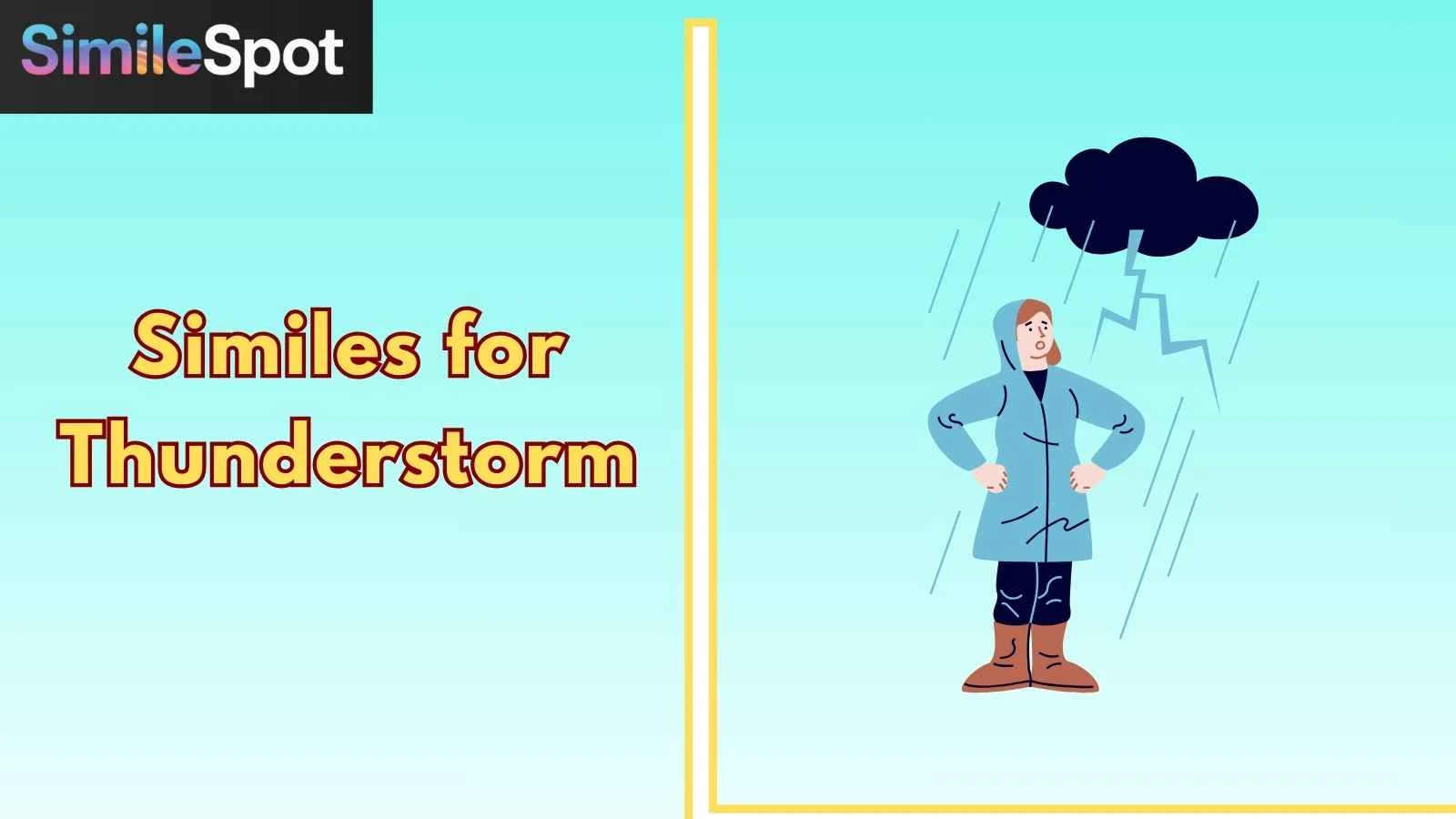Thunderstorms are nature’s dramatic symphonies, blending raw power with awe-inspiring beauty. Similes, those clever comparisons using “like” or “as,” help us capture their intensity in words.
They paint vivid pictures, making descriptions leap off the page. Whether you’re a writer, poet, or simply love the thrill of a storm, these comparisons bring thunderstorms to life.
This article unveils a curated collection of similes that spark creativity and ignite imagination. Read on to discover how these metaphors can electrify your writing and make every storm a masterpiece.
Quick Definition of a Simile
A simile is a figure of speech that compares two things using “like” or “as.” It adds color and depth to descriptions, making them relatable and vivid. For thunderstorms, similes turn raw energy into poetic imagery.
Table of 5 Quick Similes for Thunderstorms
| Simile | Meaning | Example Sentence |
|---|---|---|
| A thunderstorm is like a dragon’s roar. | It conveys the storm’s loud, fearsome sound. | The thunderstorm roared like a dragon, shaking the village. |
| Thunder is as loud as a cannon blast. | It highlights the explosive noise of thunder. | Thunder echoed as loud as a cannon blast, startling us all. |
| Lightning flashes like a camera’s strobe. | It compares lightning’s quick light to a camera flash. | Lightning flashed like a camera’s strobe, freezing the night. |
| Rain falls like a curtain of silver. | It describes heavy rain as a shimmering barrier. | Rain fell like a curtain of silver, blurring the horizon. |
| The storm rages like an angry giant. | It portrays the storm’s wild, uncontrollable energy. | The storm raged like an angry giant, tearing through the sky. |
Thunder roars like a lion in the wild

- Meaning: The thunder’s deep, powerful sound mimics a lion’s fierce roar.
- Definition: Compares thunder’s intensity to a lion’s commanding presence.
- Example 1: As the storm rolled in, thunder roared like a lion in the wild, shaking the windows.
- Example 2: The night was silent until thunder roared like a lion in the wild, waking the town.
Lightning strikes like a whip cracking
- Meaning: Lightning’s swift, sharp motion resembles a whip’s snap.
- Definition: Emphasizes the quick, startling nature of lightning.
- Example 1: Lightning struck like a whip cracking, slicing the dark sky in two.
- Example 2: Each bolt flashed as lightning struck like a whip cracking, electrifying the air.
Rain pours like a broken dam
- Meaning: Heavy rain flows with unstoppable force, like water from a breached dam.
- Definition: Highlights the relentless, overwhelming nature of rain.
- Example 1: Rain poured like a broken dam, flooding the streets in minutes.
- Example 2: The storm hit, and rain poured like a broken dam, drenching everything.
The storm dances like a wild performer
- Meaning: The storm’s chaotic energy mimics a performer’s untamed movements.
- Definition: Captures the storm’s dynamic, unpredictable motion.
- Example 1: The storm danced like a wild performer, twirling clouds across the sky.
- Example 2: As winds howled, the storm danced like a wild performer, captivating us all.
Thunder rumbles like a distant drum

- Meaning: Thunder’s low, rolling sound resembles a drumbeat from afar.
- Definition: Evokes the steady, rhythmic quality of thunder.
- Example 1: Thunder rumbled like a distant drum, signaling the storm’s approach.
- Example 2: The sky growled as thunder rumbled like a distant drum, echoing through the valley.
Lightning flashes like a neon sign
- Meaning: Lightning’s bright, sudden glow mimics a flickering neon light.
- Definition: Emphasizes the vivid, eye-catching brilliance of lightning.
- Example 1: Lightning flashed like a neon sign, illuminating the stormy night.
- Example 2: The sky lit up as lightning flashed like a neon sign, dazzling onlookers.
Rain falls like a thousand tiny hammers
- Meaning: Rain’s rapid, forceful drops feel like small hammers striking surfaces.
- Definition: Conveys the intense, repetitive impact of heavy rain.
- Example 1: Rain fell like a thousand tiny hammers, pounding the roof relentlessly.
- Example 2: The storm unleashed rain falling like a thousand tiny hammers, soaking the earth.
The storm howls like a pack of wolves
- Meaning: The storm’s fierce winds sound like wolves crying in unison.
- Definition: Captures the eerie, primal sound of stormy winds.
- Example 1: The storm howled like a pack of wolves, sending chills down my spine.
- Example 2: Winds screamed as the storm howled like a pack of wolves, rattling the trees.
Lightning zigzags like a jagged scar

- Meaning: Lightning’s irregular path resembles a scar’s rough outline.
- Definition: Highlights the sharp, uneven shape of lightning bolts.
- Example 1: Lightning zigzagged like a jagged scar, tearing across the sky.
- Example 2: The storm flared as lightning zigzagged like a jagged scar, striking fear into hearts.
Thunder booms like a judge’s gavel
- Meaning: Thunder’s loud, commanding sound mimics a gavel striking.
- Definition: Emphasizes thunder’s authoritative, attention-grabbing noise.
- Example 1: Thunder boomed like a judge’s gavel, silencing the night.
- Example 2: The storm declared itself as thunder boomed like a judge’s gavel, echoing everywhere.
Rain cascades like a waterfall
- Meaning: Heavy rain flows smoothly and powerfully, like a waterfall.
- Definition: Describes the continuous, graceful rush of rain.
- Example 1: Rain cascaded like a waterfall, transforming streets into rivers.
- Example 2: The storm’s rain cascaded like a waterfall, washing away the dust.
The storm brews like a witch’s cauldron
- Meaning: The storm’s swirling clouds resemble a bubbling cauldron.
- Definition: Evokes the mysterious, ominous buildup of a storm.
- Example 1: The storm brewed like a witch’s cauldron, dark and foreboding.
- Example 2: Clouds churned as the storm brewed like a witch’s cauldron, ready to unleash chaos.
Lightning dances like a firecracker
- Meaning: Lightning’s rapid, sparkling bursts mimic firecrackers exploding.
- Definition: Captures the lively, erratic nature of lightning.
- Example 1: Lightning danced like a firecracker, popping across the stormy sky.
- Example 2: The night sparkled as lightning danced like a firecracker, thrilling onlookers.
Thunder growls like an angry beast
- Meaning: Thunder’s deep, menacing sound resembles a beast’s growl.
- Definition: Emphasizes the intimidating, animalistic quality of thunder.
- Example 1: Thunder growled like an angry beast, shaking the house.
- Example 2: The storm’s roar came as thunder growled like an angry beast, fierce and wild.
Rain lashes like a sailor’s whip
- Meaning: Rain’s sharp, stinging drops mimic a whip’s lash.
- Definition: Conveys the harsh, cutting sensation of heavy rain.
- Example 1: Rain lashed like a sailor’s whip, stinging my face as I ran.
- Example 2: The storm hit hard, with rain lashing like a sailor’s whip against the windows.
The storm surges like an ocean wave
- Meaning: The storm’s forceful energy resembles a crashing wave.
- Definition: Highlights the overwhelming, sweeping power of a storm.
- Example 1: The storm surged like an ocean wave, sweeping through the valley.
- Example 2: Winds roared as the storm surged like an ocean wave, unstoppable and fierce.
Lightning flares like a sudden spotlight
- Meaning: Lightning’s bright flash mimics a spotlight turning on.
- Definition: Emphasizes the dramatic, illuminating effect of lightning.
- Example 1: Lightning flared like a sudden spotlight, revealing the stormy landscape.
- Example 2: The sky glowed as lightning flared like a sudden spotlight, startling us.
Thunder crashes like falling boulders
- Meaning: Thunder’s loud, heavy sound resembles boulders tumbling down.
- Definition: Captures the massive, earth-shaking impact of thunder.
- Example 1: Thunder crashed like falling boulders, echoing through the mountains.
- Example 2: The storm roared as thunder crashed like falling boulders, shaking the ground.
Rain drums like a marching band
- Meaning: Rain’s steady, rhythmic patter mimics a band’s drumline.
- Definition: Highlights the consistent, musical quality of rain.
- Example 1: Rain drummed like a marching band, filling the air with rhythm.
- Example 2: The storm’s rain drummed like a marching band, steady and loud.
The storm swirls like a tornado’s fury
- Meaning: The storm’s chaotic motion resembles a tornado’s spin.
- Definition: Emphasizes the wild, spiraling energy of a storm.
- Example 1: The storm swirled like a tornado’s fury, tossing debris everywhere.
- Example 2: Clouds spun as the storm swirled like a tornado’s fury, fierce and untamed.
Lightning sparks like a welder’s torch
- Meaning: Lightning’s bright, fiery flash mimics a torch’s spark.
- Definition: Conveys the intense, searing light of lightning.
- Example 1: Lightning sparked like a welder’s torch, cutting through the darkness.
- Example 2: The sky blazed as lightning sparked like a welder’s torch, brilliant and sharp.
Thunder rolls like a bowling alley
- Meaning: Thunder’s prolonged rumble resembles bowling pins crashing.
- Definition: Captures the continuous, echoing sound of thunder.
- Example 1: Thunder rolled like a bowling alley, rumbling through the night.
- Example 2: The storm’s sound grew as thunder rolled like a bowling alley, loud and long.
Rain pelts like a hail of arrows
- Meaning: Rain’s sharp, rapid drops mimic arrows striking a target.
- Definition: Highlights the aggressive, piercing nature of rain.
- Example 1: Rain pelted like a hail of arrows, stinging my skin as I ran.
- Example 2: The storm unleashed rain pelting like a hail of arrows, relentless and fierce.
The storm rages like a battlefield
- Meaning: The storm’s chaotic intensity resembles a war zone.
- Definition: Emphasizes the violent, tumultuous energy of a storm.
- Example 1: The storm raged like a battlefield, with thunder and lightning clashing.
- Example 2: Winds howled as the storm raged like a battlefield, fierce and chaotic.
Lightning slices like a silver blade
- Meaning: Lightning’s sharp, bright streak mimics a blade cutting through.
- Definition: Conveys the precise, cutting motion of lightning.
- Example 1: Lightning sliced like a silver blade, splitting the stormy sky.
- Example 2: The night flared as lightning sliced like a silver blade, sharp and swift.
Thunder echoes like a cathedral bell
- Meaning: Thunder’s resonant sound mimics a large bell’s chime.
- Definition: Highlights the deep, lingering quality of thunder.
- Example 1: Thunder echoed like a cathedral bell, ringing through the valley.
- Example 2: The storm’s sound grew as thunder echoed like a cathedral bell, solemn and grand.
Rain sweeps like a painter’s brush
- Meaning: Rain’s broad, flowing motion resembles a brushstroke.
- Definition: Captures the smooth, artistic movement of rain.
- Example 1: Rain swept like a painter’s brush, coating the streets in sheen.
- Example 2: The storm’s rain swept like a painter’s brush, transforming the landscape.
The storm screams like a banshee
- Meaning: The storm’s shrill winds mimic a banshee’s wail.
- Definition: Emphasizes the eerie, piercing sound of stormy winds.
- Example 1: The storm screamed like a banshee, chilling everyone indoors.
- Example 2: Winds howled as the storm screamed like a banshee, wild and haunting.
Lightning bursts like a star exploding
- Meaning: Lightning’s sudden, bright flash resembles a star’s detonation.
- Definition: Conveys the explosive, radiant energy of lightning.
- Example 1: Lightning burst like a star exploding, lighting up the entire sky.
- Example 2: The storm flared as lightning burst like a star exploding, dazzling us.
Thunder pounds like a blacksmith’s hammer
- Meaning: Thunder’s forceful sound mimics a hammer striking an anvil.
- Definition: Highlights the heavy, rhythmic impact of thunder.
- Example 1: Thunder pounded like a blacksmith’s hammer, shaking the house.
- Example 2: The storm’s roar grew as thunder pounded like a blacksmith’s hammer, relentless and strong.
Crafting Vivid Stories with Thunderstorm Similes
Similes can transform your writing, adding depth and emotion. In poems, use similes like “thunder roars like a lion” to evoke raw power, setting a dramatic tone. For stories, weave similes like “rain pours like a broken dam” to build tension or describe a character’s turmoil. In songs, rhythmic similes like “rain drums like a marching band” create vivid imagery that pairs with melody. For essays, similes make descriptions relatable, such as “lightning flashes like a neon sign” to engage readers. Experiment by combining similes with sensory details to make your thunderstorms leap off the page.
Weaving Similes into Creative Works
To make your writing stand out, choose similes that match your tone. A dark, suspenseful story might use “the storm screams like a banshee” to heighten fear. In contrast, a romantic poem could use “rain sweeps like a painter’s brush” for a softer, artistic touch. Mix similes with metaphors or personification for richer imagery. For example, pair “lightning zigzags like a jagged scar” with “the sky wept furiously” to create a layered, immersive scene.
Enhancing Emotional Impact with Similes
Similes connect readers emotionally to your work. In a novel, “thunder crashes like falling boulders” can mirror a character’s inner chaos. In a reflective essay, “the storm brews like a witch’s cauldron” might symbolize brewing conflict. Choose similes that resonate with your audience’s experiences, making abstract emotions tangible. Test different similes to find the perfect fit, ensuring your writing feels authentic and evocative.
FAQs
What is a simile for a thunderstorm?
A simile for a thunderstorm compares its features to something else using “like” or “as,” such as “thunder roars like a lion in the wild.”
How can similes enhance storm descriptions?
Similes make storm descriptions vivid and relatable, turning raw elements like thunder or rain into familiar, emotional imagery.
Why use similes in creative writing?
Similes add color and depth, helping readers visualize and feel the scene, like comparing lightning to a “silver blade” for drama.
Can similes be used in non-fiction?
Yes, similes enrich non-fiction by making descriptions engaging, such as “rain falls like a curtain of silver” in a weather report.
How do I create my own thunderstorm similes?
Compare the storm’s sound, look, or feel to familiar objects, like “lightning sparks like a welder’s torch,” using “like” or “as.”
Conclusion
Thunderstorms inspire awe, and similes capture their magic in words. From roaring thunder to flashing lightning, these comparisons bring stories, poems, and essays to life.
Use them to paint vivid scenes and evoke emotions. Let these similes spark your creativity, turning every storm into a masterpiece. Try them in your next project and watch your writing shine.

I am a passionate writer at SimileSpot who loves playing with words. I create clear and creative similes to make ideas easy to understand and fun to read.

